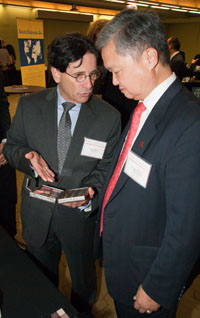Recession-proof field attracts local business investment, interest from undergraduates
The lowly package has a big job to do. It has to showcase and sell the product it encloses. It has to protect its content from all kinds of threats: heat, moisture, being dropped or shaken. It has to assure the customer that the goods inside haven’t been tampered with and are safe to consume.
And in recent years, it has faced a new test: to be “green.” When a consumer pitches an empty package into the trash or recycling, it has to cause little harm to the environment.
Designing packages that fulfill these oft-conflicting roles is a job for Rutgers engineers.
Rutgers hosts one of the country’s dozen or so university packaging research and education programs, and has been doing so since 1965. Enrollment and investment in the program, however, had slipped in recent years. Not acceptable, say New Jersey’s business leaders, who need new talent to meet packaging challenges that the state’s pharmaceutical, cosmetic, food product, and other industries face.
Fortunately, business leaders and School of Engineering administrators have taken steps to revitalize the university’s packaging program. A group of 50 businesses has raised $110,000 in funding for the program, and more than 30 undergraduates this year have declared packaging engineering as their major. Last year, the program had only three undergraduate students.
“There is no recession in packaging,” said Hae Chang Gea, professor of mechanical and aerospace engineering and the program’s new director. “Companies are begging us to produce more engineers who are trained in packaging – either in designing packages or the machines that produce them.”
The program’s rebirth started in February when School of Engineering Dean Thomas Farris appointed Gea, a faculty member for 18 years, to become its director. One of the first things Gea did was to reach out to the program’s alumni, many of whom hold industry leadership positions.
“I’ve never seen alumni with this amount of passion,” he said.

“It’s the job I was looking for,” she said, noting that she works with bottle sealing and blister packaging machines. “At Bayer, I saw how the machines worked. But I learned the fundamentals at Rutgers.”
Her manager, Guido Schmitz, who also hired alumna Regina Deluca last spring, hopes Bayer’s support gives him a line on up-and-coming Rutgers students. “I want to see in the early stages what students can do with us,” he said. “Whatever we have to do to make the program state-of-the-art, I will support.”
Michael Lee, now a junior, changed his major from electrical and computer engineering last year. Just back from a packaging industry trade show in Las Vegas, he said his “eyes were opened” to the range of opportunities. “Packaging engineering takes its contents from each type of engineering,” he said.
Gea agrees, but doesn’t stop there. “I’d like to work across the university, with pharmacy, food science, law, and business, and even art.”
At a fundraising dinner in October sponsored by the program’s industrial advisory board, corporate members set up and staffed displays of their products. Students had the opportunity to ask industry representatives about the nature of their businesses, and the reps had the chance to establish relationships that could lead to employment opportunities.
“There are more requests for co-op students, summer interns, and employees than Rutgers can offer, but that will change as Rutgers enrolls more students,” said Charles Chang, president of Topline Products in Wayne and chair of the advisory board. His company, which makes packaging for the cosmetics industry, has contributed $50,000 annually to the program for the past three years. Chang is a 1975 graduate of the packaging engineering program.
The program began with corporate support more than 45 years ago – a gift from Ira S. Gottscho, who moved his family’s packaging machinery business from Brooklyn to New Jersey and saw a need to train packaging specialists to serve area industries. In 2007, his widow and successor as CEO, the late Eva Gottscho, pledged $1.5 million to equip a packaging engineering laboratory in the school’s new Biomedical Engineering Building.
Students enrolled in their second and third years in the program received a special gift funded by the board – an Apple iPad tablet computer that will be the basis for instructional materials in the coming year. Gea explains that students will use these as more than simply e-readers. Professors will develop course materials that are interactive, enabling students to change package designs, shapes, or colors within in their texts.